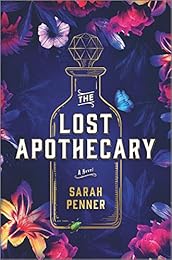The novel has two time periods and three perspectives. In 1791 London, we meet Nella Clavinger, an apothecary who, from her hidden shop, provides poisons to women wanting to rid themselves of abusive men in their lives. One day, Eliza Fanning, a twelve-year-old lady’s maid, comes for poison requested by her mistress. The two develop an unexpected friendship. Both Nella and Eliza’s points of view are given. In contemporary London, we meet Caroline Parcewell. She and her husband were to be celebrating their 10th anniversary in London, but she recently learned of his infidelity so took the trip on her own. She goes mudlarking, discovers an apothecary’s vial, and sets out to find out more about it because of its unusual marking.
The book starts strong but I started losing patience and interest with the oh-so-convenient plot turns. Nella keeps a register in which she records all the transactions, in essence naming both the murderer and victim. Her rationale is that she wants to preserve “the memory of these women in the register – granting them their single, indelible mark on the world” because “the existence of these women . . . would otherwise be erased from history.” Despite the fact that numerous women know of the shop’s existence, she thinks it’s safe to keep this register, that any woman’s “’secret is safe in here’”?! It’s also troubling that Nella never asks questions of her clients; she doesn’t question to determine if they want to kill a man because of self-interest or because of self-preservation. It doesn’t matter to her? Wanting to help women who have no other option to address the abuse they are experiencing might be understandable, but she prepares poisons without knowing whether the woman is “a victim or a transgressor”?
Caroline is even more unbelievable. She finds a vial, explores an undiscovered building in the heart of London, and then links her discoveries to documents in the British Museum? Everything she needs to find, she finds easily; everything just falls into place very quickly. She has a degree in History but her poor knowledge of proper research skills left me wondering how she ever earned that degree. This same person thinks that an application to a university guarantees acceptance, even for someone who has done no academic work for ten years?
The author is at pains to emphasize Caroline’s personal growth during her few days in London. On her first day, she finds a vial and she immediately concludes that “This glass object – delicate and yet still intact, somewhat like myself – was proof that I could be brave, adventurous, and do hard things on my own.” Only hours later, “I could feel the change in myself at this very moment: the discontent within me seizing the possibility of an adventure, an excursion into my long-lost enthusiasm for eras past.” After one day in the city, “The youthful, adventurous Caroline had begun to come alive again. I thought of my unused history degree, my diploma shoved away in a desk drawer. As a student, I’d been fascinated by the lives of ordinary people, those whose names weren’t acknowledged and recorded in textbooks. And now, I’d stumbled on the mystery of one of those nameless, forgotten people – and a woman, no less.” A woman who has apparently done no self-reflection for a decade, not even knowing that she is happy but unfulfilled, so quickly experiences epiphanies and can even narrate her own growth?
There are other implausibilities. An amateur stumbles on a centuries-long mystery? Caroline finds that particular vial used by Eliza? Caroline and Gaynor develop such a deep friendship after a couple of encounters, so that Gaynor signs a text message with “Gaynor xx” and even covers for Caroline despite suspecting that she has been less than completely truthful with her? In 1791, Nella writes about “Ms. Allie Bechem” and about “Miss Berkwell”; I know that Ms. originated in the 17th century, but why would the apothecary use two different honorifics? The magical deus ex machina is also annoying, especially considering that Caroline dismisses magic; the author seemed overly concerned to have a feel-good ending.
This book is an easy read, a quick bit of entertainment. Unfortunately, its shallowness and its contrived, implausible plot overshadowed my enjoyment.

No comments:
Post a Comment